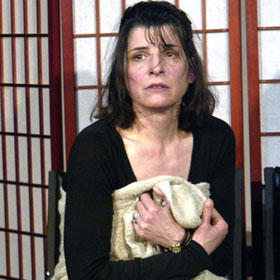'Bob: Blessed Be The Dysfunction That Binds' Review: An Intimate Family Portrait

3.5/5
Bob: Blessed Be The Dysfunction That Binds, a one-woman show written and performed by Anne Pasquale is a deeply moving and personal theater experience – it would feel disrespectful to categorize Bob as a play. The show runs almost two hours long, and Pasquale goes strong every second. The play acts as a memoir of Pasquale’s life, growing up with her two sisters and an autistic brother who also suffered from various mental illnesses that caused him to become occasionally violent.
Bob is currently playing at the Abingdon Theater Company in a small room that seats about thirty. The space is not cramped, but is closed off enough to make the audience feel somewhat isolated from the world outside the play. In fact, the audience is asked to participate somewhat in the show on the rare occasion Anne (Pasquale playing the role of herself) asks the audience rhetorical questions. Pasquale takes her time getting the audience acclimated to the chaotic home environment she presents, slowly transitioning into playing each of her family members, one by one. She has one piece of clothing to signify a change in character: her mother dons an apron and her father a red cap.
Though Pasquale embodies all of her immediate family members on the stage, the story is always told from Anne’s point of view. Pasquale provides insight into her family members, but these insights do not feel forced or false. Everything Pasquale does on stage shows a respect towards her family members, and it is clear that family means a great deal to the performer.
After the performance, the audience was asked to stay for a discussion with a guest speaker and Pasquale herself. Pasquale appeared almost in tears – the show clearly took an emotional toll on her. And it definitely had a deep impact on the audience members who stayed.
Directed by Mary Ann Hay, the show is elegant in its simplicity, putting the focus on Pasquale and her story as opposed to elaborate sets or decore. The show sometimes dips into Anne's mind, and she occasionally breaks into song (popular music re-written with lyrics about her life). The idea is nice, but does get a bit tiresome by the end of the show. However, these impromptu musical performances give the audience a taste of Anne/Pasquale's witty and clever side (a welcome break from the heavy subject matter).
Bob is an ambitious and intimate family portrait that succeeds in using one family to point at a larger problem: how modern society treats those with disabilities and/or mental illnesses. It is a strong work, mainly due to the courage with which Pasquale bares her family dynamics on the stage. It is both personal and universal, and, without a doubt, will have a lasting impression on anybody who attends.
Get the most-revealing celebrity conversations with the uInterview podcast!






Leave a comment